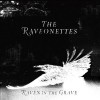 For a duo that started out as VU and JAMC copyists nearly a decade ago, the Raveonettes have progressed a long way. They came close to perfecting their bubblegum-sweet melodies and blasts of razor-sharp guitar hooks on their last album, 2009's In and Out of Control. Smartly, their new album doesn't look to one-up past accomplishments—it takes a hard left into uncharted territory.
For a duo that started out as VU and JAMC copyists nearly a decade ago, the Raveonettes have progressed a long way. They came close to perfecting their bubblegum-sweet melodies and blasts of razor-sharp guitar hooks on their last album, 2009's In and Out of Control. Smartly, their new album doesn't look to one-up past accomplishments—it takes a hard left into uncharted territory.
 
Raven in the Grave takes risks with the Raveonettes' established sound. The songs are far less oriented toward the sticky-sweet vocal melodies and sing-along hooks that upheld previous albums, focused instead on building up a dark, wintry mood over the album's length. Songwriter Sune Rose Wagner hangs up his guitar for much of the album, opting instead for layers upon layers of chilly synthesizers and spacious ambience. Several songs abstain from the ultra-catchy, verse-chorus structures at which Wagner and Sharin Foo excel: "War in Heaven," for example, sandwiches a mantra nearly devoid of meaning—"Wait / a war in heaven / I hate it when they forget to let people in"—in between a twinkling synth melody and a coda of ear-splitting feedback. The songs are mostly mid-tempo; vocals are hidden behind translucent sheets of reverb; melodies are often obscured, less memorable than their past work; and the album is overwhelmed by feelings of sadness and resignation.
With these developments, the trade-off is a loss of the immediacy that has been a hallmark of prior albums, most noticeably the instant rush of hearing Wagner and Foo's vocals intertwine around melodies that overwhelm on first listen like a mainlined shot of sugar. There are occasional hints of that approach on Raven in the Grave, but they are fleeting—certainly nothing approaching the joyful overdrive of "Dead Sound" or "Last Dance." The closest the Raveonettes come to touching on their past formula is "Ignite," which succumbs to a propulsive tempo, dual harmonies and Wagner's fuzzy guitar lines, yet holds to the stark production that pervades the album, sounding like the band recorded in a state of deep depression at the North Pole. (They actually recorded in Denmark, their home turf.) Ultimately, though, Raven is a necessary evolution for a band that had taken its noise-pop confectionery as far as it could go without repeating itself.
The album was self-produced by the Raveonettes—a first, and a sign that Wagner and Foo are fully committed to this new direction. Raven in the Grave has all the hallmarks of a grower; luckily, none of its experimentation comes across as tentative, half-assed or uncertain. That strong sense of confidence is what eventually sold me on the album's dense, Arctic production and melancholy melodies.
Samples:

